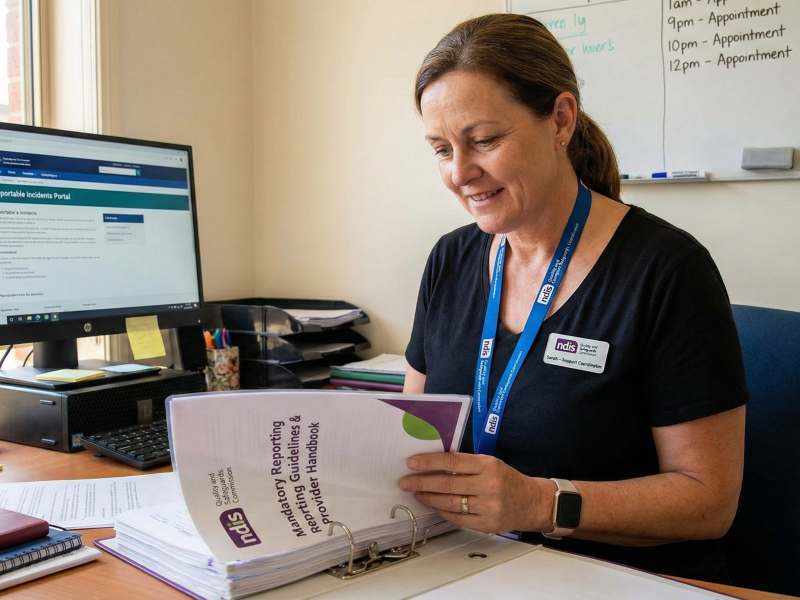The National Disability Insurance Scheme or simply – the NDIS – is a government program in Australia aimed at supporting people with disabilities so that they can gain access to services and live independently. It was introduced in the year 2013, and is now a fundamental aspect of Australia’s care industry.
The NDIS funds a range of disability support services that help Participants achieve their professional and personal aims. The scheme has revolutionised disability care in Australia, enabling individuals with disabilities to receive customised services that improve their way of living.
Companies and individuals who wish to offer services under the NDIS scheme may be required to become Registered NDIS Providers to provide services as per national standards.
About the NDIS Commission
The NDIS Quality and Safeguards Commission or NDIS Commission is a government agency that regulates and oversees NDIS Providers. Founded to ensure the safety, rights, and quality of service for NDIS Participants, the Commission determines standards that the Providers need to comply with to maintain best practices in disability care.
The NDIS Commission ensures that support Providers comply with the rules. It resolves complaints and imposes penalties on those who do not comply. The Commission also ensures that Participants receive high-quality, safe, and effective support services. Providers need to Register with the Commission to operate under the NDIS.
Want to Attract More NDIS Clients?
Get expert advice on how to market your services, connect with clients, and grow your practice.
Registration Process
The NDIS Provider Registration process incorporates several major steps.
Here is a step-by-step breakdown of the Registration process:
1.Determine Eligibility
Before Application, prospective Providers should consider whether they are eligible. Eligibility is determined by the kind of services to be provided, the organisational structure, and conformity with NDIS rules. Providers of services must conform to the NDIS Practice Standards and Code of Conduct.
2. Application Submission
Applicants should apply online through the NDIS Commission’s Registration portal. The application needs to provide information including:
- Business structure and ABN (Australian Business Number)
- Service types provided
- Policies and procedures relevant to the business
- Adherence to the NDIS Code of Conduct
3. Audit Process
Upon submission, Providers are required to go through an audit by an approved audit body. The audit type varies based on the Provider’s risk level and service category:
- Verification Audit (for lower-risk Providers)
- Certification Audit (for higher-risk Providers providing complex care services)
During the audit, Providers are required to prove compliance with NDIS Practice Standards. This includes presenting documentation, operational policies, and proof of quality service delivery.
4. NDIS Commission Review
After the audit, the NDIS Commission evaluates the results and determines if the Provider satisfies all requirements. If it succeeds, the Provider is awarded a formal Registration Certificate and can start providing NDIS-funded services as a Registered Provider.
5. Continuous Compliance and Renewal
Providers, once Registered, have to adhere to NDIS Pricing Rules, be audited periodically, and have their Registration renewed every three years to continue being compliant with NDIS standards.
Requirements and How to Get Certified
For your business to become a NDIS-certified (as “Registered Provider), there are some key requirements:
1. Follow NDIS Practice Standards
Providers must follow NDIS Practice Standards, which cover governance, Participant rights, service delivery, and risk management. These standards help ensure safety, quality, and a focus on Participants’ needs.
2. Staff Qualifications and Training
Providers must ensure their staff have the right qualifications, training, and experience to deliver disability services. Background checks like Working with Children and National Police Checks may be necessary.
3. Business Policies and Procedures
Applicants must create policies that align with NDIS guidelines, including those on privacy, incident management, risk assessment, and Participant engagement.
4. Insurance and Legal Requirements
NDIS Providers must have enough insurance, such as public liability and professional indemnity insurance. They must also follow workplace health and safety laws.
5. Passing an Audit
As part of the Registration process, Providers must pass a verification or certification audit. Keeping proper documentation and ensuring compliance will help make the audit easier.
Referrals Start With Reputation – We’ll Help You Build Both
From networking tips to service refinement, we guide NDIS providers toward lasting impact.
FAQs
Q1. How do I become a certified NDIS Provider?
To become a certified NDIS Provider, you need to register with the NDIS Commission’s online portal, provide relevant business information, get audited, and meet the necessary standards. If approved, you will be issued with an NDIS Registration certificate.
Q2. Do I have to be certified to be an NDIS Provider?
No, you do not have to be certified as Registered Provider to deliver services to most Participants.
Q3. How long does it take to become an NDIS Registered Provider?
It can range from three to six months, contingent on the complexity of services provided, the audit process, and review time by the NDIS Commission.
Q4. Can I be an unRegistered NDIS Provider?
Yes, however Registration is mandatory for providing services to plan-managed and agency-managed Participants, providing SDA and implementing behaviour supports.
Q5. How frequently is NDIS Provider certification renewed?
NDIS Provider certification is generally renewed every three years. Providers are required to be audited and have their Registration renewed to maintain continued compliance with NDIS standards.


